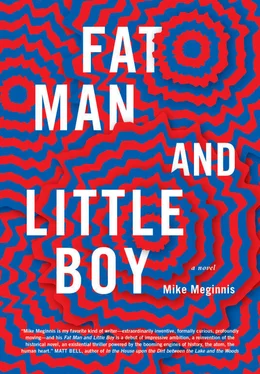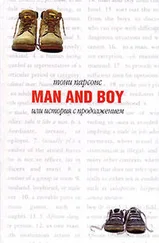“I would like that,” says the girl, putting her fingers on his fingers.
“You might.” He looks down at her hand touching his. “Please don’t touch me.”
The girl withdraws her hand. The medium gathers his brother’s box to his breast, feeling the smooth, cool grain. He leans close enough to breathe its dusty, wooden scent. Like loaded dice rolling into place, his mind finds focus. It seeks a voice, a dead man’s. The dead man is coming to him. They will meet in the middle. He will blank his mind and let it take a new shape, a new fire, burning through the fibers, and this will change the features of his face, drawing tight weak, neglected muscles, and slacking others favored by the medium, making the face feel as a pudding, shot through with stubborn strands or grains, entangled in a numbed mesh, a speaking slab joined to the skull.
The ghost enters the medium.
The ghost favors the eyebrows, the forehead, the muscle ridges of the cheeks. He lunges the head forward, close as he can to his daughter. “Adèle?”
“Daddy?”
“What have you done with my money?”
“It’s still there, Daddy. We’ve only spent a little.”
“It has to last you your whole life.”
“I can work,” says the young bride. “Gilbert will go into business.”
“You married Gilbert?”
“He’s a good boy. He takes care of me.”
“I worry about you.” The medium’s face falls. His eyes water.
“Do you feel this?” She touches the medium’s hand.
“No. I don’t.”
Masumi does.
“Do they still use my planes?” says the medium’s face.
“Yes. Of course they do.”
They talk about family things. She tells him of the aunt who died. The medium’s mouth grows tired and dry. He needs a taste. How to tell the ghost? There is nothing to do for it but wait.
Later, when the ghost leaves Masumi, he feels his body tremor. The strange, other shape fades from his brain, his face. He is himself.
“Thank you,” says the young bride. “It was strange. That was really him, wasn’t it?”
“Next time I could be your grandmother.” He pops the cork on a wine bottle and drinks from it, pulling the feather needle from his forehead. A drop of blood lands on the table, wet and heavy and still.
“I might be afraid to come again,” she says.
“There’s one other thing,” says the medium. “You’re pregnant.”
“How can you know that? You see the dead.”
“Sometimes the living are dead come back.”
Summer.
Claire rides her new bicycle behind Matthew’s old one. He pumps his legs fast, pushing ahead, making her race. Her calves burn, thighs groan, lungs threaten collapse. Does he think girls only like the boys who race them? Boys who can kick up great spurts of mud with their wheels? The feeling of knowing they have a long way to go before they can ride the way you do? The stupid, careless teeter of your careening vehicle’s rear end?
She does like it.
He’s led her to his home, and now they weave between the cabins, around a tree like a willow, past bemused wives and relaxing husbands, some with lemonades in hand, some eating pastries, bananas, or wedges of orange. They are careful to avoid spraying dirt on the guests, but not too careful. The women love to see children at play. The men love to see their women love to see children at play.
A gust of wind, and Claire clutches her hat, pushing it down with the butt of her fist. The brim obscures the world. When she pushes it back into place, Matthew has swerved out of sight. She slows, braking almost too hard, and searches. He’s on her left, at the entrance to a cabin like any other, jumping down from his bicycle’s seat in an almost-graceful dismount designed to obscure the difference between the length of his legs and the height of his wheels. The dirt smears his bare ankles—his cuffs pulled up, it seems, for just such an occasion.
He motions her to follow. Her bike stalled, all momentum lost, she climbs off and walks it to the cabin. Matthew takes a brass key from his pocket and opens the door. To her surprise, he wheels the bike in with him, mud and all, tracking smears onto the floor.
She hesitates at the threshold. He comes back to the door and motions her in. “Come on,” he says, in English, ducking back inside. She follows him. She dirties the floor with her bike as well and leans it against the wall beside his.
What a strange place. All the furniture has been pushed up against the walls, creating as much empty floor as possible. The chairs are upside-down on the table the way the staff puts them in restaurants come closing time. The empty floor is, apart from layered, aging bike tracks, scrupulously clean—but less clean than blank, really, because “clean” implies a sort of arrangement, and here there is nothing arranged, there is nothing to be arranged.
There is one pillow on the bed, center-mattress. There is one blanket. There is a sack of coal against the wall beside the furnace, only a little used. The furnace is neat, and the floor around it not smudged at all with black, as with other furnaces. There are no hangings on the walls, and the windows are covered with cloth shades, sky blue, to let in a little light. It is very dim.
Matthew sits cross-legged in the middle of the cabin, hands at rest on his knees, breathing deeply. He opens one eye to check on Claire, closes it when he sees she’s fine, she’s calm too, she’s still there.
“It’s so quiet here,” says Claire. “Peter would hate it.”
She traces the sky-blue fabric’s edges, picks off a fuzzball. She holds it in her fist, loathe to drop it on the pristine floor. “They let you have your own place?”
“No,” he answers, in his slow, cotton-mouthed French, “but we don’t have enough guests to fill up. There are a few secret cabins like this one.”
“You speak well when you want to,” says Claire. “You should do it more often.”
“I don’t like to,” says Matthew, in English.
“Why not?” says Claire. She sits down with him, facing, their knees touching through her skirt, his pants. “Is it hard for you? I could help. I’m good at talking.”
“This is a quiet place,” says Matthew. “I like to be quiet.”
“It’s not a quiet place outside.” Claire leans back, her hand flat on the floor.
“I am a quiet place.”
Claire shrugs it off. If he’s got to be quiet then she can love the quiet. She can be a quiet place too. She closes her eyes and imagines a meadow, seeds and spores afloat above the whorls of tall grass, the grass in shades of green, gray, brown, yellow, green. Framed by lovely trees, thin enough that you can see the way their shadows drape each other and make a network on the ground—branches interlocking branches like one thousand elbows, wavering as waver the strands of light that lick the bottom of a water dish laid out in the sun.
“Peter would hate this,” she says. “This quiet. He couldn’t stand it. He would have to challenge you, or sing a song, or draw on the walls, mess up the place. My mother says he won’t be satisfied until he makes everything look the way he looks, which, according to my mother, is the way that he feels.”
Matthew takes in a long breath. He lets it out on its own schedule. It makes her budding bosoms itch to see the flatness of his boy-bosom. She can spend what seems like an hour pinching and kneading her nipples if there’s no one in the house. In the quiet her body is loud.
Matthew says, “What?”
“I was just saying how Peter doesn’t like some things that we like. You don’t like some of the things me and Peter like, too, but I was thinking how what he doesn’t like, that you and I do like, is quiet, and being quiet together.”
Читать дальше












